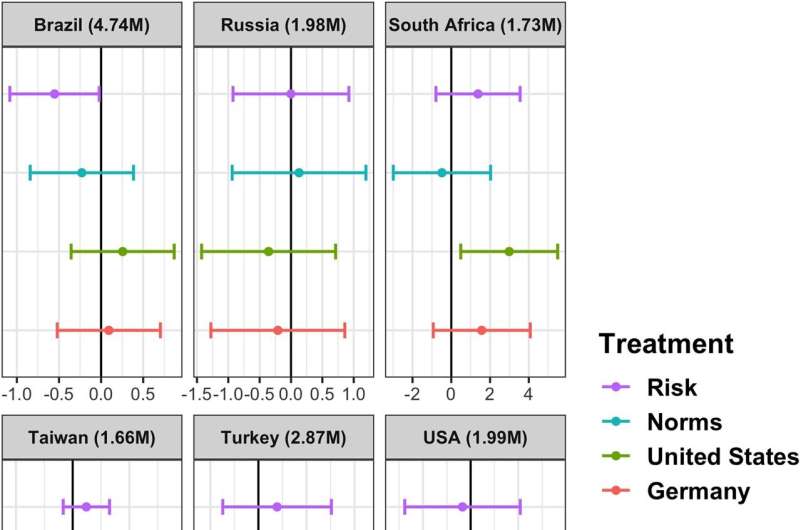This article has been reviewed according to Science X's editorial process and policies. Editors have highlighted the following attributes while ensuring the content's credibility:
fact-checked
peer-reviewed publication
proofread
'Nudge' ads, messages designed to have influence, fail to motivate vaccination

One popular strategy to motivate people to get vaccinated is the nudge—a message designed to take advantage of human tendencies to conform to social norms, seek to protect loved ones or community, and to prefer treatments with high efficacy rates.
Jiseon Chang and colleagues sought to assess the efficacy of such nudges in real world contexts during the COVID-19 pandemic. The authors paid for ads to appear on Facebook between October 2021 and January 2022, reaching almost 15 million users in Brazil, Russia, South Africa, Taiwan, Turkey, and the United States. All ads included stock images of happy people spending time together. Placebo ads simply urged users to click a link to sign up for the vaccine. Nudge ads included additional information.
The research was published in PNAS Nexus.
One nudge ad noted that "87% of people are already or plan to be vaccinated." This ad did not receive more clicks than the placebo in most countries and received significantly fewer clicks than the placebo in Taiwan—a surprising result, as nudges suggesting that vaccination is the norm perform well in lab settings and surveys.
Another nudge urged users to "protect lives in your family"—a message that outperformed the placebo in Taiwan and Turkey but not elsewhere—or to "protect lives in your community" or "protect your life" both of which decreased clicks in the United States. Broadly, most nudges seemed to have no effect in most countries—and were even liable to backfire in certain contexts.
According to the authors, when crafting pro-vaccine messages, the best strategy may be to build on country-specific norms, rather than appealing to a presumed universal human nature.
More information: Behavioral nudges in social media ads show limited ability to encourage COVID-19 vaccination across countries, PNAS Nexus (2024). DOI: 10.1093/pnasnexus/pgae189, academic.oup.com/pnasnexus/art … /3/8/pgae189/7727701
Journal information: PNAS Nexus
Provided by PNAS Nexus




















